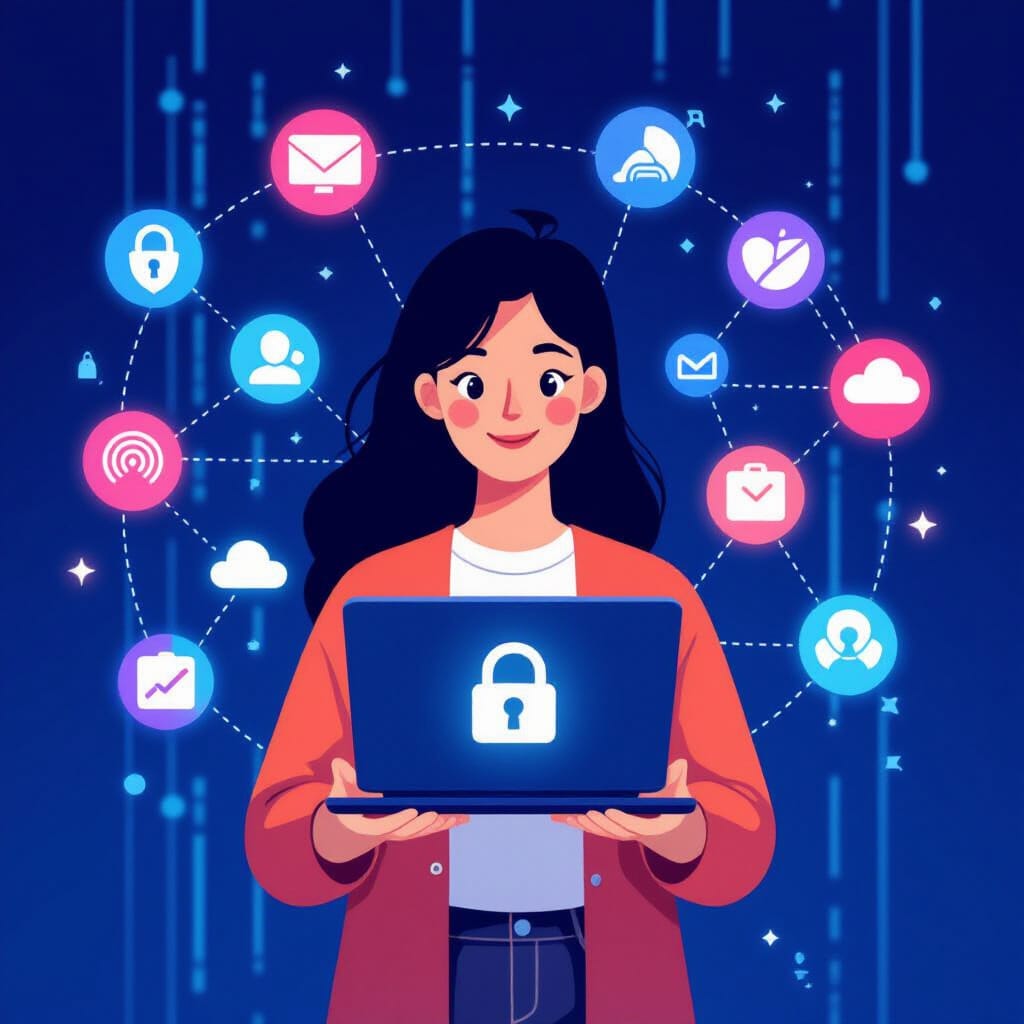Introduction: The Urgency of Online Privacy
In today’s data-driven economy, privacy is no longer a given—it’s a choice. Whether you’re shopping on Amazon or browsing forums on the dark web, your digital activity is being tracked, cataloged, and sometimes sold. Governments, corporations, data brokers, and even malicious hackers all want a piece of your digital footprint.
This guide provides ten actionable, easy-to-implement steps to protect your privacy online. Whether you’re an average user trying to secure your everyday browsing or someone exploring the Deep Web for anonymity, these strategies are your first line of defense.
1. Use a Privacy-Focused Browser
Most users rely on Chrome, but Google’s browser is known for data collection. Consider these alternatives:
- Brave: Blocks trackers and ads by default. Built-in Tor tab for added privacy.
- Firefox (hardened): Customizable with privacy add-ons.
- Tor Browser: Ideal for .onion sites and encrypted routing, albeit slower.
Always disable telemetry and auto-sync features in any browser you use.
2. Choose Search Engines That Don’t Track You
Ditch Google if privacy matters. Here are trusted alternatives:
- DuckDuckGo: Doesn’t store user data or search history.
- Startpage: Delivers Google search results anonymously.
- Mojeek: An independent crawler that doesn’t track you.
These alternatives strip away your search queries from third-party profiling.
3. Use Encrypted Email Services
Traditional email (Gmail, Yahoo) is vulnerable to surveillance and advertising. For sensitive communications, consider:
- ProtonMail: Open-source, end-to-end encrypted, based in Switzerland.
- Tutanota: Focuses on usability with strong encryption.
- Skiff: Decentralized and privacy-focused.
Set up aliases and never use real names in your email handles.
4. Secure Your Devices
A compromised device undermines every other privacy measure. Key tips:
- Enable full-disk encryption (FileVault for macOS, BitLocker for Windows).
- Set strong, alphanumeric device passwords.
- Use fingerprint or Face ID sparingly—biometrics can’t be changed if compromised.
On iOS: Go to Settings > Face ID & Passcode > Require Passcode Immediately.
5. Use a Trustworthy VPN (But Not Just Any)
A VPN hides your IP address and encrypts your internet traffic—but not all are created equal.
Choose:
- Mullvad: No logs, no email required, accepts cash and crypto.
- ProtonVPN: Based in Switzerland, no logs, supports Tor routing.
- IVPN: Transparent privacy audits, open-source clients.
Avoid free VPNs. Many sell your data to stay afloat.
6. Harden Your Mobile Privacy Settings
Smartphones are privacy nightmares by default. To minimize data leakage:
- Disable ad tracking: Settings > Privacy > Apple Advertising > Turn Off Personalized Ads
- Block microphone and camera access on non-essential apps.
- Use DNS-based blockers like NextDNS or 1.1.1.1 with Warp.
- Periodically reset your ad ID.
7. Be Smart About Social Media
Social media is the single biggest privacy compromise. If you must use it:
- Limit posts to private audiences.
- Disable facial recognition and tagging.
- Avoid posting personal identifiers like birthdays or locations.
Better yet, use anonymous platforms like Mastodon or Reddit with burner accounts.
8. Use Messaging Apps with End-to-End Encryption
Not all messaging apps are private—even if they claim encryption.
Best options:
- Signal: Open-source and backed by cryptographers. Minimal metadata.
- Session: Built on a decentralized network. No phone number required.
- Threema: Anonymous registration. Swiss-based.
Avoid: SMS, Facebook Messenger, and Instagram DMs—they’re not secure.
9. Practice Good OPSEC (Operational Security)
Even with the right tools, bad habits expose you. Basic OPSEC includes:
- Never reuse usernames or passwords.
- Don’t link your real identity to anonymous accounts.
- Avoid clicking unknown links or downloading unverified files.
Consistency is key—one slip can unravel everything.
10. Use Privacy-Focused Operating Systems When Needed
If you’re venturing into the Deep Web or handling sensitive tasks, use OSs designed for anonymity:
- Tails: Boots from a USB, erases data after shutdown.
- Qubes OS: Uses security domains to isolate tasks.
- Whonix: Routes all traffic through Tor, hardened for anonymity.
Pair these with external hardware wallets and burner phones for high-level OPSEC.
Bonus Tip: Use Cryptocurrency Privately
When paying for privacy tools or services:
- Use privacy coins like Monero (XMR) or Zano.
- Use mixers or CoinJoin wallets for Bitcoin.
- Avoid linking exchange accounts to real-world identity.
Remember: cryptocurrency is traceable unless used carefully.
Staying Legal and Ethical
Exploring privacy tools doesn’t make you a criminal. Whistleblowers, journalists, and human rights activists rely on anonymity to do vital work.
Respect the laws in your jurisdiction and use tools ethically. Avoid:
- Accessing illegal marketplaces
- Participating in cybercrime
- Bypassing regulations for malicious intent
Common Privacy Myths Debunked
Myth: “I have nothing to hide.”
Reality: You still lock your door. Privacy isn’t secrecy—it’s control.
Myth: “Apple and Google protect me.”
Reality: They still collect vast amounts of metadata and behavior analytics.
Myth: “VPNs make me invisible.”
Reality: Only if you choose wisely and use them properly.
Tools & Resources
- The Hidden Wiki (for .onion sites)
- PrivacyGuides.org
- EFF Surveillance Self-Defense
- RestorePrivacy
- ProtonMail’s Onion Site
Final Thoughts: Privacy Is a Lifelong Discipline
Online privacy isn’t a one-time checklist—it’s an ongoing mindset. The Deep Web may demand extra caution, but even everyday internet use deserves protection. Adopt these ten tips as your digital hygiene routine.
Remember: You can’t control the internet, but you can control your exposure to it.
Disclaimer
This article is intended for educational purposes only. We do not endorse illegal activities, and readers should comply with all applicable laws.

Leave a Reply